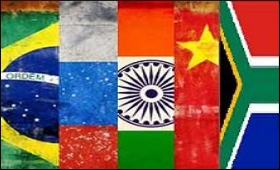|

|
'MSMEs should be focus of BRICS bank for investment diversification'
|
|

|
|
| Top Stories |
 |
|
|
|
SME Times News Bureau | 31 Mar, 2017
The New Development Bank (NDB), also known as the BRICS Bank, should focus on Micro, Small and Medium Enterprises (MSMEs) for diversification of investments, this view emerged at the day-long convention on the "People's perspectives on the New Development Bank" organised by the People's Forum on BRICS on Thursday ahead of NDB's annual meeting in New Delhi.
NDB should reduce export-led, economic-growth-oriented development approach and look for diversification of investments by focusing on Micro, Small and Medium Enterprises (MSMEs) instead of favouring big corporations, said Caio Borges, a lawyer from the Business and Human Rights project of Conectas (Brazil).
The NDB is having its second annual meeting here from March 31 to April 2.
"At this meeting, the NDB would discuss its strategic policy. Thus civil society is putting forward its vision that the bank should prioritize small scale investments instead of large scale infrastructure projects which often bring more negative impact, more exclusions and aggravate existing vulnerabilities rather than bring about actual development," Borges added.
Madhuresh Kumar of National Alliance of People's Movements (NAPM) said while the NDB was set up as an alternative to West-focused World Bank, it was now pushing the same corporate-led development model.
"In India, this corporate-led development, or neo-liberal development, has led to impoverishment of people, farmer suicides, large scale privatisation, natural resource loot and environmental degradation.
"NDB is unfortunately pushing the same model which was earlier pushed by the World Bank group and other international financing institutions," Kumar told IANS.
Benny Kuruvilla from Transnational Institute agreed and added the BRICS was created immediately after the 2008 financial crisis by emerging powers which could challenge the West as well as the neo-liberal paradigm.
"But what we have seen nearly 10 years after its creation is that BRICS seems to be reiterating same sort of development model.
"We have heard from friends in South Africa that it has been accessing land, indulging in unsustainable mining where communities are being impacted and environment is being damaged. So it is the same old paradigm but now by a new set of actors," Kuruvilla told IANS.
Soumya Dutta from Beyond Copenhagen Collective said the dominant narrative presently was about economic development of India and Brazil as the emerging economies while the plight of people, especially at the bottom of the pyramid, was missing from this narrative.
He said with the neo-liberal development, not only the inequality in income distribution was becoming more defined, but people's access to minimum life support systems was also "going down tremendously" despite the fast growth of the economy.
"The NDB is projecting infrastructure projects as fundamental requirement for uplifting people when the focus should be on fulfilling the basic needs of people so they could secure access to services," Dutta told IANS.
He added that the majority of the funding by the NDB was given to two major sectors -- energy and infrastructure -- while other sustainable goals like alleviating poverty and providing basic healthcare were missing from its priorities.
"The investments made by the NDB are actually profit-oriented and not sustenance-oriented," he said.
Dutta added the organisation was more focused on safeguarding its investments rather than safeguarding the interest of the people, and that's why it was investing on big private corporates.
NDB, popularly known as the BRICS Bank, was set up by the BRICS countries (Brazil, Russia, India, China and South Africa) based on an agreement at the BRICS summit in Brazil in 2014.
|
|
|
| |
|
|
|
|
|
|
|
IMPORTING HITECH MANUFACTURING UNITS
GHANSHYAM TOSHNIWAL | Wed Apr 5 05:32:15 2017
Many Indian middle class SME entrepreneur has no approach to new technologies of developed countries. For example, we are using decade old DAL-MILLs where as there is new technology is already in existence which can give more output of quality product (Dal) with less wastage. Textile looms are century old & European second hand (Used) textile machines are being imported @ heavy cost through middle man. Most funny thing is Europeans are replacing latest technology by selling old ones to Indian poor SME entrepreneurs. Developed countries are selling decade old refurbished medical equipment (like MRI/Scanning/Sonography etc;) to India instede they use latest technology. Tyre Retreading - India is using 50 year old technology where as European technology gives more usage, saves power & pollution. I, therefore, suggest to ADB (a) to establish one special wing for India who can guide / suggest / introduce latest technological projects (b) to find out some foreign (SME) entrepreneurs who are ready to establish joint ventures in India @ 51/49 sharing (c) introduce latest technological projects to Indian SME. Please note, there is great strength hidden in Indian SME and if opportunity is given, miracles happen. For example: Hon'ble Supreme Court banned sales of BSIII vehocles wef 01.04.2017, and world surprised to note that a day before, lower middle men purchased 0.9 billion two-wheeler (approx INR 5000 crore) without taking any bank loan.

|
|
|
|
|
|
|
| |
| Customs Exchange Rates |
| Currency |
Import |
Export |
US Dollar
|
66.20
|
64.50 |
UK Pound
|
87.50
|
84.65 |
Euro
|
78.25
|
75.65 |
| Japanese
Yen |
58.85 |
56.85 |
| As on 13 Aug, 2022 |
|
|
| Daily Poll |
 |
 |
| PM Modi's recent US visit to redefine India-US bilateral relations |
|
|
|
|
|
| Commented Stories |
 |
|
|
|
|
|
| |
|